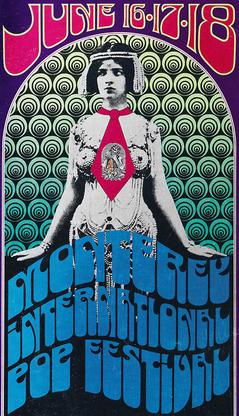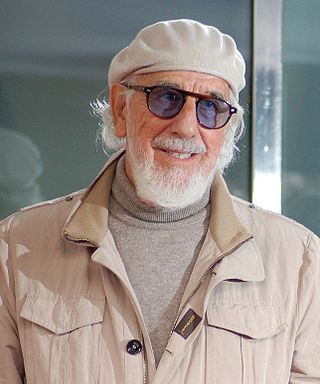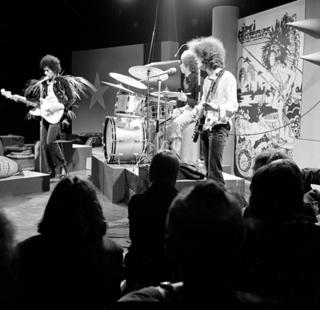
Woodstock Music and Art Fair, commonly referred to as Woodstock, was a music festival held during August 15–18, 1969, on Max Yasgur's dairy farm in Bethel, New York, United States, 40 miles (65 km) southwest of the town of Woodstock. Billed as "an Aquarian Exposition: 3 Days of Peace & Music" and alternatively referred to as the Woodstock Rock Festival, it attracted more than 400,000 attendees. Thirty-two acts performed outdoors despite sporadic rain. It was one of the largest music festivals in history.

The Monterey International Pop Festival was a three-day music festival held June 16 to 18, 1967, at the Monterey County Fairgrounds in Monterey, California. The festival is remembered for the first major American appearances by the Jimi Hendrix Experience, the Who and Ravi Shankar, the first large-scale public performance of Janis Joplin and the introduction of Otis Redding to a mass American audience.

Bert Kaempfert was a German orchestra leader, multi-instrumentalist, music producer, arranger, and composer. He made easy listening and jazz-oriented records and wrote the music for a number of well-known songs, including "Strangers in the Night", “Danke Schoen” and "Moon Over Naples".

Donn Alan Pennebaker was an American documentary filmmaker and one of the pioneers of direct cinema. Performing arts and politics were his primary subjects. In 2013, the Academy of Motion Picture Arts and Sciences recognized his body of work with an Academy Honorary Award. Pennebaker was called by The Independent as "arguably the pre-eminent chronicler of Sixties counterculture".

Woodstock is a 1970 American documentary film of the watershed counterculture Woodstock Festival which took place in August 1969 near Bethel, New York.

Lester Louis Adler is an American record and film producer and the co-owner of the Roxy Theatre in West Hollywood, California. Adler has produced and developed a number of iconic musical artists, including The Grass Roots, Jan & Dean, The Mamas & the Papas and Carole King. King's album Tapestry, produced by Adler, won the 1972 Grammy Award for Album of the Year and has been called one of the greatest pop albums of all time.

Michael Scott Lang was an American concert promoter, producer, and artistic manager who was best known as a co-creator of the Woodstock Music & Art Festival in 1969. Lang served as the organizer of the event, as well as the organizer for its follow-up events, Woodstock '94 and the ill-fated Woodstock '99. He later became a producer of records, films, and other concerts, as well as a manager for performing artists, a critically acclaimed author, and a sculptor.
Joel Rosenman conceived and co-created the Woodstock Festival in 1969. Rosenman thought of the idea for the three-day concert when he and business partner John Roberts were evaluating a proposal from Michael Lang and Artie Kornfeld for a recording studio in upstate New York. The four went on to create the event. Rosenman and Roberts are the co-authors of Making Woodstock, originally published as Young Men with Unlimited Capital, a non-fiction account of their exploits as producers of Woodstock.

The Miami Pop Festival is the name by which a music festival that took place on May 18-19, 1968 in Hallandale, Florida, is sometimes known. The venue was Gulfstream Park, a horse racing track just north of Miami. The event, which was officially publicized on promotional materials and in radio ads as the "1968 Pop and Underground Festival," and "The 1968 Pop Festival," was promoted by Richard O'Barry, Marshall Brevetz and Michael Lang, the latter of whom became famous as one of the four promoters of Woodstock in 1969. Decades later, the May 1968 festival began to be referred to colloquially as the "Miami Pop Festival", leading to confusion with the actual Miami Pop Festival, which took place in December 1968.

Historic Performances Recorded at the Monterey International Pop Festival is a live album recorded at the Monterey Pop Festival in June 1967. A split artist release, it includes some of the performances by the Jimi Hendrix Experience on side one and Otis Redding on side two. It has been supplanted by later more comprehensive releases, Live at Monterey and Captured Live at the Monterey International Pop Festival .
Edward Herbert Beresford "Chip" Monck is an American Tony Award nominated lighting designer, most famously serving as the master of ceremonies at the 1969 Woodstock Festival.

Jimi Hendrix is a 1973 rockumentary about Jimi Hendrix, directed and produced by Joe Boyd, John Head and Gary Weis. The film contains concert footage of Hendrix from 1967 to 1970, including the Monterey Pop Festival the 1970 Isle of Wight Festival, Woodstock and a Berkeley concert. The film also includes interviews with Hendrix' contemporaries, family and friends. Others appearing in the film include Paul Caruso, Eric Clapton, Billy Cox, Alan Douglas, Germaine Greer, Hendrix' father, James A. "Al" Hendrix, Mick Jagger, Eddie Kramer, Buddy Miles, Mitch Mitchell, Juggy Murray, Little Richard, Lou Reed and Pete Townshend. Noel Redding refused to be interviewed as he had a pending lawsuit against the Hendrix Estate.
"Monterey" is a 1967 song by Eric Burdon & The Animals. The music and lyrics were composed by the group's members, Eric Burdon, John Weider, Vic Briggs, Danny McCulloch, and Barry Jenkins. The song provides an oral account of the June 1967 Monterey Pop Festival, at which the Animals performed. Burdon namedrops several of the acts who performed at the festival such as the Byrds, Jefferson Airplane, the Who, the Grateful Dead, and Jimi Hendrix. In 1968, two different video clips of the song were aired.
John P. Roberts was an American businessman who bankrolled the Woodstock Festival. He was the heir to the Polident/Poli-Grip denture adhesive fortune.

Keep on Rockin', aka Little Richard: Keep on Rockin is a film of a 1969 Little Richard concert at the Toronto Rock and Roll Revival festival originally released in 1970. The film is in colour.
Monterey County Fairgrounds is the site of the annual Monterey County Fair. It is located within the city limits of Monterey, California.

Chris Hegedus is an American documentary filmmaker. She and her husband, filmmaker D. A. Pennebaker, founded the company Pennebaker Hegedus Films.

Jimi Hendrix (1942–1970) was an American guitarist and singer-songwriter whose career spanned from 1962 to 1970. He appeared in several commercially released films of concerts and documentaries about his career, including two popular 1960s music festival films – Monterey Pop (1968) and Woodstock (1970). A short documentary, Experience (1968), also known as See My Music Talking, was also screened.

Live: Ravi Shankar at the Monterey International Pop Festival is a live album by Indian sitarist Ravi Shankar, released on the World Pacific record label in November 1967. It consists of part of Shankar's celebrated performance at the Monterey International Pop Festival in California on 18 June 1967. Shankar was accompanied throughout by his regular tabla player, Alla Rakha, who performs a frenetic five-minute solo on the recording.

Woodstock – Back to the Garden: The Definitive 50th Anniversary Archive is a live album by various artists, packaged as a box set of 38 CDs. It contains nearly all of the performances from the Woodstock music festival, which took place on August 15–18, 1969, in Bethel, New York. The CDs also include many stage announcements and miscellaneous audio material. The box set also contains bonus material such as a Blu-ray copy of the director's cut of the Woodstock documentary film, a hardcover book written by concert promoter Michael Lang, and a replica of the original concert program. It was released by Rhino Records on August 2, 2019, in a limited edition of 1,969 copies.















